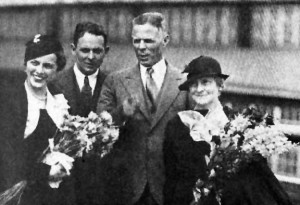In the Garden of Beasts by Erik Larson
Written by Ashley Kelmore, Posted in Reviews
Three Stars
Who doesn’t want to start the year with a book about pre-WW II Nazi Germany? I mean, what better way to ease into an attempted double cannonball?
Despite the subject matter, this book is not a challenging read. I read Mr. Larson’s book about the Chicago World’s Fair (Devil in the White City) either last year or the year before and found it to be good but tough to get through. This book flowed better, although it didn’t really end. I mean, obviously, it did, but it felt more like I was reading a very long and exquisitely researched magazine article than a book with a narrative arc.
In the Garden of Beasts follows the U.S. Ambassador to Germany from 1933-1934. William Dodd was a history professor in Chicago when he was asked by President Roosevelt to serve; he brought his wife and two adult children with him to Berlin. The story follows Mr. Dodd and his daughter Martha as they navigate Nazi German, when Hitler was Chancellor and there was still a President who was ostensibly in charge.
The main point of the book is that Dodd wasn’t the typical old boys club rich kid ambassador and as such was a bit less interested in the economic issues that the U.S. State Department wanted to address and was more concerned with what was going on with Hitler, the SS, the SA and all the players who we now know were instrumental in WW II and the Holocaust. I have not read a book on WW II or the Holocaust since Diary of Anne Frank, so I can’t claim that everything in the book is wholly accurate, but Mr. Larson is known for writing truthful and well-researched historical non-fiction by telling the stories of the people involved, so I assume it is mostly correct.
I’m not sure if I really learned much new by reading the book. I suppose I learned that the U.S. government was primarily concerned with getting back money from Germany as opposed to the oppression and murder of German residents. But I wasn’t surprised to learn that. It sort of matches the priorities the political elite have always had: money first, then people – maybe, eventually, if there is time.
If you like history, and are interested in Germany just before WW II, I’m certain you could do worse than this book. Just don’t expect a real beginning, middle and end. And be prepared, if you get the non-kindle-version, to mark out the swastikas on the cover. I get not burying that reality, but damn. I don’t want to give people a heart attack while reading a book walking down the street that has a few scattered Nazi symbols on it.

